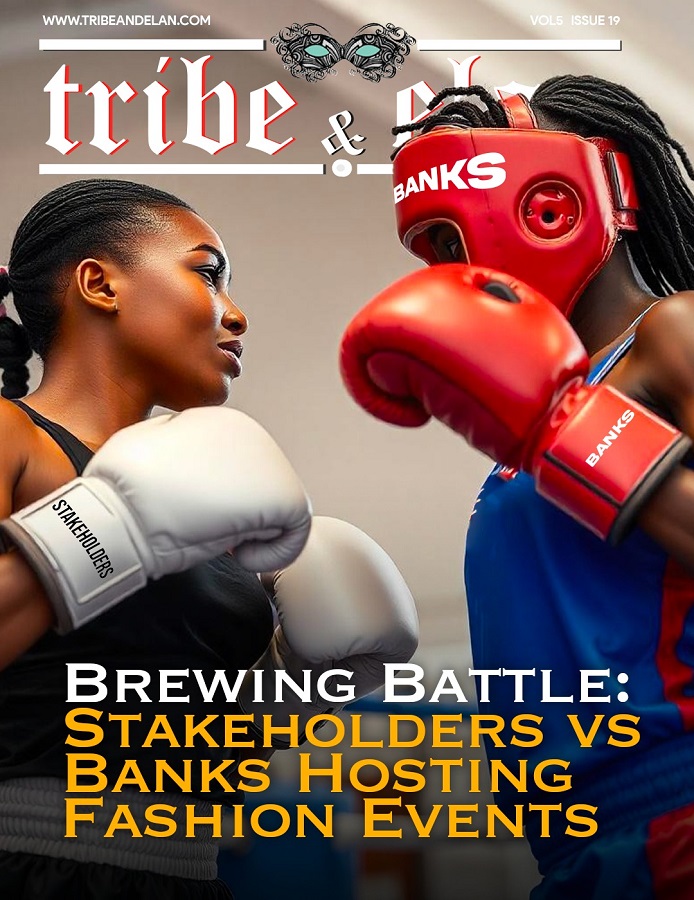

In recent years, the Nigerian fashion scene has blossomed, with numerous events celebrating creativity, culture, and style. These events are essential not only for showcasing talent but also for supporting small and medium enterprises (SMEs) within the industry. However, a silent battle is brewing between Nigerian banks hosting fashion events under the strategic banner of CSR by promoting SMEs while budding players and stakeholders in the industry are left to seek for funds elsewhere thus dashing their hopes for financial support and ending their entrepreneurial fashion dreams .
Nigerian banks have increasingly positioned themselves as key players in the fashion industry by hosting and sponsoring large-scale fashion events. These banks, with their vast financial resources, often promote these initiatives as part of their corporate social responsibility (CSR) programs. The goal, they claim, is to empower SMEs, providing them with platforms to showcase their products, network with industry professionals, and gain visibility. But is it really their aim
…”The goal, they claim, is to empower SMEs, providing them with platforms to showcase their products, network with industry professionals, and gain visibility. But is it really their aim …?
For the banks, the benefits are clear: they gain positive publicity, enhance their brand image, and position themselves as supporters of local businesses. With access to ample funds, these financial institutions face minimal challenges in organizing such events. A few examples of these bank running their own shows are
Once upon a time , Fidelity bank in a bid to support Nigeria’s quest to become a leading exporter of finished fashion goods collaborated with several stakeholders to host the Anambra Fashion Expo 2022 . Ever since , they have hosted and headlined their own events – The Fidelity International Trade & Creative Connect exhibition and conference (FITCC) in Uk and Houston, Texas respectively .Also , in the past UBA was seen to sponsor Runway Jazz – which was applaud able . Today the few that are still in the race of sponsorship – Polaris bank who sponsor – The Fashion Souk , Wema Bank – Fashion Souk and First bank – Street Souk .
We all know that these financial institutions can easily afford the best venues, attract top designers and celebrities, and secure extensive media coverage. The entire process is streamlined, backed by teams of professionals who ensure everything runs smoothly. But lets take a look at the other side of the coin .
In stark contrast, individuals or small organizations hoping to host similar fashion events face a daunting array of challenges. These challenges are particularly severe when they approach the very banks that host their own fashion events for support or sponsorship.
1. Limited Access to Funds: Unlike banks, individuals do not have access to free funds. Securing sponsorship is often an uphill battle, with banks prioritizing their own events over supporting external initiatives. Many potential event organizers are turned away or offered minimal support that hardly covers basic expenses.
2. Lack of Influence and Connections: Individuals often lack the influence or connections that banks leverage to secure high-profile venues, guest appearances, or media coverage. This can result in lower visibility and reduced attendance at their events, even when the quality of the show is high.
3. Bureaucratic Hurdles: When approaching banks for sponsorship, individuals are often met with lengthy bureaucratic processes that can delay planning and execution. By the time a decision is made, it may be too late for the individual to adequately prepare, leading to a rushed or subpar event. That is if your idea is not taken , re packaged and executed aka “Stolen ”
4. High Costs and Risks: Hosting a fashion event is an expensive endeavor, especially without guaranteed financial support. Individuals must often dip into personal savings or take on loans, which come with significant risks. Unlike banks, they do not have the financial cushion to absorb losses if the event does not turn a profit.
The imbalance between banks and individuals in hosting fashion events is clear. While banks have the financial muscle, influence, and infrastructure to execute large-scale events with relative ease, individuals must navigate a minefield of challenges, often with limited resources and little support.
This disparity creates a frustrating cycle: banks dominate the fashion event space, while many talented individuals with innovative ideas struggle to find a platform. The very institutions that claim to support SMEs are, in some ways, stifling competition by monopolizing the space.
To level the playing field, banks could take a more inclusive approach by setting aside funds specifically for supporting external fashion events hosted by individuals and SMEs. By providing not just financial support but also mentorship and access to their networks, banks could truly fulfill their mission of empowering small businesses in the fashion industry.
Additionally, there should be more transparent and accessible channels for individuals to apply for sponsorships, with clear criteria and reasonable timelines. This would encourage more innovation and diversity in the types of fashion events held in Nigeria, ultimately benefiting the entire industry.
In conclusion, while Nigerian banks play a vital role in promoting the fashion industry, they must recognize the importance of supporting the very individuals and small businesses they claim to champion. By addressing the current imbalances, the Nigerian fashion scene can become more inclusive, diverse, and vibrant—where everyone has a fair chance to shine.
Source – Google
Temi Otedola, is a Nigerian actress, fashion influencer, and entrepreneur who has carved her own niche…
Celebrating Excellence: Fashion, Beauty & Lifestyle Recognition Awards 2025 As the world of fashion, beauty,…
A Mother's Love: Honoring the Life and Legacy of Mrs. Olufunmilayo Christiana Latunji The bond…
Dripped In Culture In the dynamic world of fashion, where tradition often meets modernity, Ogiame…
Latasha Ngwube: The Plus Size Queen of Fashion Strikes Again Latasha Ngwube, Media /Pr Guru, …
In the heart of Nigeria's dynamic yet challenging fashion industry, Folake Akindele stands as a…